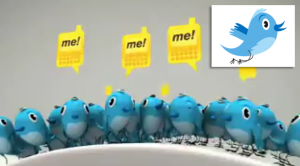This half term I have been able to get a lot done – not only have I been abroad (to Bilbao – a place very dear to me as I lived there for two years), but I have also had the chance to catch up on lots of paperwork and get to grips with a few more online tools, plus I have changed the them on this blog. So here are my recent top 5 from Twitter:
1. The first is Google Wave. I was able to get an invite and after a few days of waiting, here I am, with my very own account. Except I have very few people with whom to try it out! Luckily, as always, my Twitter network came to the rescue and @josepicardo and briefly ‘waved’ at each other – (h)ola – before agreeing that for now, Twitter is more suited to our needs. I am gradually adding other educators and I have bookmarked a few articles to read, but I reckon this tool will really take off when more of us are able to enjoy it.
2. Another tool that I really like the look of is Xtranormal, which (again, thanks to @josepicardo) looks as though it has massive potential in the classroom. See an example of the animated videos created by his Spanish 6th form students on his department’s website.
3. ImageChef is a wordle-esque tool that @icpjones has recently blogged about. It allows calligrams to be made (an image of a word made up with the word) and as Isabelle writes, it can be adapted, embedded and/or downloaded. I think the Word Mosaic tool and the Visual Poetry tools look the most exciting. Enjoy!
4. I have recently tweeting and blogged about a website called YacaPaca. It is a free website, where pupils log in with a given name and password, and teachers log in with theirs. Teachers can make interactive exercises and assign them to pupils so that when the pupil logs in, they see just the exercises they need to do. One or more attempts can be given to the pupils, and their results are recorded in the online markbook. It is also possible to look at the results in-depth and display the questions on-screen in ‘whiteboard’ mode. A pretty useful tool for independent computer room work or for homework – and not just for MFL!
5. The last of my top tools for now will have to be Storybird as my PLN has been talking about it over the last few weeks. See some exemplar stories from Dom, Clare and Lisa and now one from me too! For now stories written in a foreign language are not public, but you can access the ones you have made from your account of from a link, for now, just English ones are embeddable.

It is also definitely worth mentioning the many CPD opportunities that are coming our way this month. The first is this weekend at the Languages Show, Olympia London with its own Show & Tell session, followed by MFL Flashmeeting 4 on Monday 2nd November. Saturday 14th November is the MFL Show & Tell event in Coventry. I am also doing two sessions for the University of Cumbria for the MFL PGCE students on using Spanish in the classroom and have set up a wiki for them where I have stored the session’s resources and where I want them to hand in their homework on the merits of learning Spanish. Fingers crossed the session will be enjoyable!
 d discussions on new technology that Santa brought us for Christmas, discussing our New Year’s resolutions with regards to using ICT to enhance language lessons, tips and tricks to help Year 11 with their speaking skills, ways to use collaborative tools such as vokis, wallwisher and voicethread safely in the classroom, and even how to turn your whiteboard into what looks like a Wii, with the use of a Wii Remote and an infrared sensor bar.
d discussions on new technology that Santa brought us for Christmas, discussing our New Year’s resolutions with regards to using ICT to enhance language lessons, tips and tricks to help Year 11 with their speaking skills, ways to use collaborative tools such as vokis, wallwisher and voicethread safely in the classroom, and even how to turn your whiteboard into what looks like a Wii, with the use of a Wii Remote and an infrared sensor bar.


